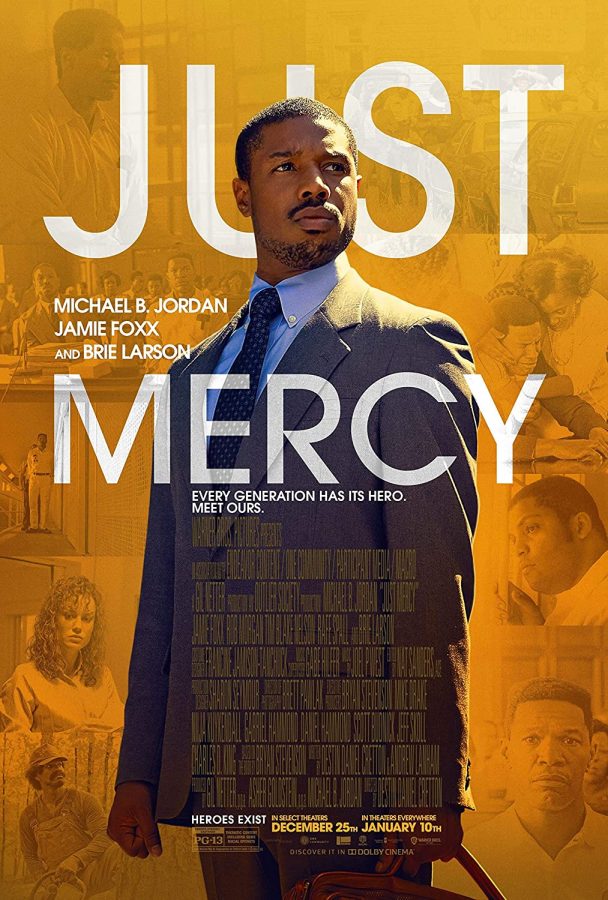Review: “Just Mercy” shows the reality of racial discrimination in the South
May 6, 2020
Destin Daniel Cretton’s film “Just Mercy” follows the true story of Alabama-born Walter McMillian, a pulpwood worker wrongfully convicted of murdering an 18-year-old girl. Distributed by Warner Bros. Pictures, award-winning actor Jamie Foxx portrays McMillian as he waits on death row in Monroe County, alongside other potentially innocent inmates.
African-American lawyer Bryan Stevenson, the protagonist of the narrative, makes his way to Monroeville, Alabama shortly after graduating Harvard in hopes of defending those who have been failed by the justice system. Played by “Black Panther” and “Creed” star Michael B. Jordan, Stevenson takes on McMillian’s case. The young defense attorney witnesses firsthand just how far citizens, policemen and prosecutors are willing to go in order to keep a black man locked up for a crime he did not commit against a white woman.
The film’s painfully accurate portrayal of racism in the south is heartbreaking, eye-opening and necessary.
While some are aware of the brutal discrimination and prejudice black communities in America suffer from, watching the injustices unfold through the unfiltered story of a real man’s life highlights the unjust and distorted way communities, particularly those in the South, viewed African-Americans, regardless of their age, gender or social status. Cretton’s film causes the audience to acknowledge the alarming truth that racial discrimination is likely the reason various black men and women have spent unwarranted time in prison cells, where many have even died.
Known widely for his roles in various big-screen projects including “The Amazing Spider-Man 2,” “Baby Driver” and “Annie,” Foxx’s performance in the drama earned him a nomination for a Screen Actors Guild Award for Outstanding Performance by a Male Actor in a Supporting Role. The actor portrays the hardworking and honest McMillian, nicknamed “Johnny D.,” in a precise way, practically pulling viewers into his world as he restlessly fights for his innocence with the help of Stevenson.
Civil rights defense lawyer Stevenson, whose real-life incarnation wrote the source material, is among the great characters in “Just Mercy.” Devoted to appealing Johnny D.’s murder conviction as well as defending others without proper representation, he creates the Equal Justice Initiative alongside Eva Ansley, played by “Captain Marvel” actress Brie Larson. Through their never-ending dedication in spite of personal threats, political maneuverings and coercion of all sorts, it becomes clear to the audience that they refuse to give up on their journey for lawful justice.
Being a black man himself, surrounded by people looking to tear down people of color, Stevenson is not surprised when he experiences extreme backlash and harassment as he fights for Johnny D. However, the recent Harvard University graduate prevails, ignoring all racial stereotypes while paving a powerful path of his own. Stevenson’s presence in the story is undeniably moving and downright inspiring.
While the list of spectacular qualities included in the motion picture seems to be never-ending, there is one feature, however, that takes away emphasis from the important message the emotional account is trying to leave with readers. The unnecessarily slow pace of the first half portion of the movie caused me to lose interest momentarily due to scenes that seemed to contribute to the overall plot in no way.
All in all, “Just Mercy” stands out as one of the more moving films of recent years. The real, honest story recounts a journey that made history and is guaranteed to leave you feeling invincible.
To buy or rent “Just Mercy,” click here.









Anthony and Marrianne Mongillo • Aug 5, 2020 at 6:21 pm
This article was so well written that we are compelled to watch this movie. Kudos to the author! Well done
Victor Mongillo • May 7, 2020 at 7:48 pm
An extremely well-written article.